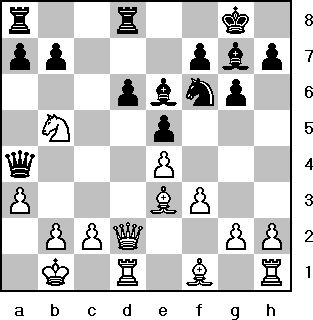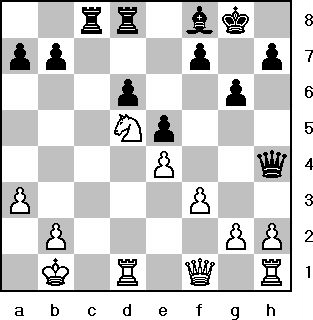|
Lesson
#6
The Power of an Idea
Today we will look at a very special chess game played between Grandmaster
Boleslavsky (white) and Lissitzin in 1956. White comes upon a totally excellent
idea. He is willing to make a sacrifice for it without any immediate material
reward. As you will see, the reward comes in due time. And, Boseslavsky’s idea
may well be the best example of the power of a strong knight outpost.
In the diagram below it is white to move. White needs to find a good idea.
What do you see? Should he take the pawn on d6? Should he develop his f1 bishop?
Or, are there any other good ideas?
|
|
 |
White to move
|
First, it is too dangerous to go pawn grabbing with 1. Nxd6. This walks
straight into a pin. White’s greed is punished by 1. Ne8 2. Bc5 Nxd6 3. Bxd6
Bf8 4. Qb4 Rxd6! Now white is facing a back rank mate because he didn’t finish
developing his pieces before going pawn grabbing.
Second, the simple 1. Be2 allows black to play the freeing move 1. … d5!
(As a rule, if black can play this move safely in the Sicilian Defense then
he/she will get a good game.)
White’s super idea is to put his knight on d5 in such a way that it can never
be taken. But how is this possible? Black has two pieces covering that
square! Watch and enjoy.
1. c4! Bxc4
If black doesn’t take this offered pawn he will never be able to play d5.
He can’t resist and says "show me."
2. Nc3 Qb3
3. Bxc4 Qxc4
4. Bg5!
Now, as a result of the pin, this final defender of d5 will be removed. White
is getting his wish ¾ a super knight on d5 ¾
but was it worth a pawn?
4. ... Qe6
5. Bxf6 Qxf6
6. Nd5
Field goal! This is worth remembering. A knight like this that can never be
chased is often worth a pawn. Notice how this knight attacks c7, e7 and f6. As a
matter of fact, the black queen only has one square to move to!
6. ... Qh4
Now what? White’s knight controls the center, but how can we take advantage of
this? Did you remember the famous chess edict: if you control the center you can
attack on the wing? Yes, the super knight enables white to start a brilliant
kingside attack.
7. Qe2 Bf8
The knight is so strong that black can’t play 7. Rac8 because of 8. g3
followed by 9. Ne7+.
So how can we now chase the black queen away and start our pawn storm on the
kingside?
8. Qf1!
This is amazing. White has prepared to attack by putting his queen on the
first rank. Thanks to the knight in the center, the pawn storm will look easy!
8. ... Rac8 (see diagram)
|
|
 |
White to move
|
9. g3 Qg5 10. h4 Qh6
Can you find what was wrong with 10. … Qxg3? Did you see that white would
play 11. Qe2 followed by Rdg1 (or 11. Rd2 followed by 12. Rg2) trapping the
black queen?
11. g4 g5 12. hxg5 Qxg5 13. Rh5 Qg6
Now white finds another beautiful move thanks to his strong knight. Hint: try
to find how can you threaten to play 14. Nf6+.
14. g5! h6 15. Rxh6
Notice how the rook is always immune because of the great knight.
15. Qxg5 16. Rh5!
And black resigned before 16. … Qg6 17. Qh1 Qe6 18. Rh8+ Kg7 19. Qh7#.
White’s plan to sacrifice a pawn and trade down to a (very) good knight vs.
bad bishop had great power. Finding and playing the very best idea is embracing
the truth. Look deeply for the truth — the very best
idea — and you will be rewarded.
Home Page ·
More Lessons
(c) 2001 Ross Stoutenborough
|